Recent Advancements in Measurement Uncertainty Workshop
Join Us for a Special Event: Recent Advancements in Measurement Uncertainty - A Two Hour Workshop with Distinguished Lecturers and President of the IEEE EMC Society! A complimentary lunch will be provided following the lecture series with four speakers. All IEEE members and non-members are welcome to this free-to-attend event hosted by the IEEE EMC Socety, but you must register in advance.
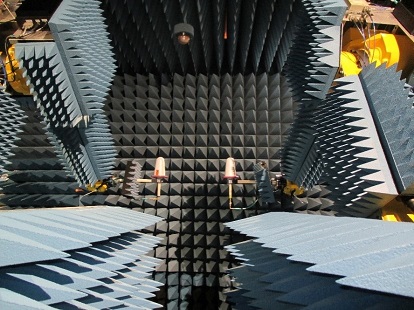
Workshop Abstract: Any kind of measurement, particularly when carried out for scientific or professional purposes, requires consideration of inherent measurement errors. Evaluation of measurement uncertainty in electromagnetic compatibility and antenna characterization applications is the common thread that connects the presentations in this workshop.
Sophisticated data processing techniques and novel measurement methods are presented aiming at enhancing the accuracy of electromagnetic field measurements with specific reference to errors induced by the measuring environment (reverberation chambers and anechoic chambers), robotic positioning systems, and a model-based system engineering approach to understand contributions from various sources of uncertainties.
This program is designed to apply to general EMC and Antenna Measurements. Speakers will actively encourage questions in order to better educate attendees on the importance of addressing measurement uncertainity.
Date and Time
Location
Hosts
Registration
-
 Add Event to Calendar
Add Event to Calendar
- World Trade Center Bangalore
- Brigade Gateway Campus, Dr. Rajkumar Road, Malleswaram (West)
- Bangalore, Karnataka
- India
- Room Number: IEEE India Headquarters #26/1, 5th Floor
- Click here for Map
- Contact Event Hosts
-
Sri Chandra: sri.chandra@ieee.org
Sr Director, Standards & Technology
Ph: +91 80 4944 4343
IEEE - Bangalore, India
- Co-sponsored by IEEE Bangalore Section
Speakers
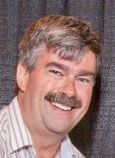 John Ladbury of National Institute of Standards and Technology (NIST)
John Ladbury of National Institute of Standards and Technology (NIST)
Uncertainty Analysis from the Early Days to Modern Usage of Reverberation Chambers
The National Institute of Standards and Technology prides itself on its ability to do precision measurements of most anything that can be measured, with uncertainties sometimes given in parts per million or parts per billion (give a few examples). And they developed methods of dealing with uncertainty analysis techniques that work pretty well when uncertainties are relatively small. But then someone comes up with the idea of placing transmitters, receivers, or just random electronics in a big metal box, scrambling the boundary conditions with big rotating paddles, and trying to make sense of field or power measurements in those boxes. For some of the earliest measurements, measurement results could vary by factors of 2, 10, or even more. And when uncertainties get that large, many of the standard methods of calculating uncertainties can give unusual or erroneous results. In this talk, we will present some of the methods we used for dealing with large uncertainties, and how improved theory, analysis techniques, and uncertainty analysis have led to new and accurate methods of evaluating antennas, and even calibrating electric field probes.
Biography:
John M. Ladbury received the B.S.E.E. and M.S.E.E. degrees (specializing in signal processing) from the University of Colorado, Boulder, in 1987 and 1992, respectively. Since 1987 he has worked on EMC metrology and facilities with the Radio Frequency Technology Division and is now with the Shared Spectrum Metrology Group in the Spectrum Technology and Research Division of the National Institute of Standards and Technology (NIST) in Boulder, CO. His principal focus has been on reverberation chambers, with some investigations into other EMC-related topics such as time-domain measurements and probe calibrations. He was involved with the revision of RTCA DO-160D and is a member of the IEC joint task force on reverberation chambers. He has been awarded four “Best Symposium Paper” awards at IEEE International EMC symposia, a Technical Achievement Award from the IEEE EMC Society for significant contributions in the development of reverberation chamber techniques for EMC applications, a US Department of Commerce Bronze Medal for his research in Reverberation Chambers, and a US Department of Commerce Gold Medal for his role in evaluating the impact of LTE wireless signals on the performance of GPS receivers.
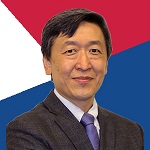 Zhong Chen of ETS-Lindgren
Zhong Chen of ETS-Lindgren
Uncertainty Contributions from EMC Test Site Imperfections for Above 1 GHz Measurements
Site VSWR (SVSWR) is traditionally used as a figure of merit for the quality of the EMC test site for above 1 GHz measurements. A site with SVSWR < 6 dB is considered suitable for performing EMC compliance measurement. It is difficult to assess measurement uncertainties from the site contribution based on these SVSWR results, because they do not contain any systematic effects nor statistical information of the site. In the current standard treatment (e.g., in CISPR 16-4-2), the site imperfection uncertainty is considered to have a triangular probability distribution, with 6 dB as the upper limit. This treatment may not be representative of the actual measurements because of the inherent undersampling of the SVSWR test method. This issue becomes even more pronounced in the mmWave frequency range. A new test method based on cylindrical mode filtering is proposed for measuring the VSWR of a site which can provide greater insights into the site contribution to measurement uncertainty. The result of the new method not only contains statistical distributions of the reflections contribution, but also systematic effects such as the receive antenna beam coverage of the test zone. We illustrate how uncertainty can be assessed using this new test method.
Biography:
Zhong Chen is the Director of RF Engineering with ETS-Lindgren, located in Cedar Park, Texas. He has over 25 years of experience in RF testing, anechoic chamber design, as well as antenna and EMC field probe design and measurements. He is a past member of the Antenna Measurement Techniques Association (AMTA) Board of Directors and is currently a member of the IEEE EMC Society Board of Directors. Mr. Chen is the Chair of Subcommittee 1 of ANSC C63, which is responsible for EMC antenna calibration (C63.5) and test site validation (C63.4) standards. He is also chair of the IEEE Standard 1309 committee responsible for developing calibration standards for field probes, and IEEE Standard 1128 for absorber measurements. He has served as a Distinguished Lecturer for the IEEE EMC Society and is currently a member of the EMC Society Board of Directors. His research interests include measurement uncertainty, time domain measurements, and development of novel RF absorber materials. Mr. Chen received his M.S.E.E. degree in Electromagnetics from the Ohio State University at Columbus.
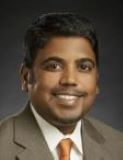 Vignesh Rajamani of Exponent
Vignesh Rajamani of Exponent
IEEE EMC Society - Latest Member Benefits
Biography:
Vignesh Rajamani is an expert in the electromagnetic characterization and application of reverberation chambers with Exponent. A main thrust of his research and project experience in the area of reverberation chambers has been towards increasing test accuracy. His expertise includes statistical electromagnetics, validation and optimization techniques for computational electromagnetics, communication system testing in complex multipath environments, EMI/C Issues with Unmanned Aerial Systems, antenna systems and radio frequency (RF) design, and estimation probability of failure of electronic systems due to electromagnetic interference and compatibility. In his role as a Manager at Exponent, he assists clients with identifying the root cause of the failures of electronic systems and providing guidance on possible solutions, especially in the area of EMI/C. Dr. Rajamani is the President of the IEEE Electromagnetic Compatibility (EMC) Society and involved with several technical committees and educational activities in the EMC Society. He served as the Vice President of Member Services for the IEEE Electromagnetic Compatibility (EMC) Society from 2014-2020. He is a Senior Member of IEEE and served as a Distinguished Lecturer for the IEEE EMC Society for term 2013-2014. He has lectured around the world on reverberation chamber test methodologies and has taught design engineering seminars for faculty and students at many universities focusing on challenges in engineering education and prepare the faculty to handle them by spreading a significant number of Project Based Learning (PBL) classes across the curriculum. Prior to joining Exponent, Vignesh was with Oklahoma State University as a Visiting Assistant Professor where he taught courses in engineering design and performed research in probability of failure of electronic systems in harsh electromagnetic environments. He has also taught the reverberation chamber course at OSU for the past 10 years and served as subject matter expert for various standard bodies.
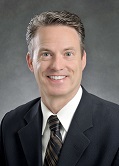 Dennis Lewis of Boeing
Dennis Lewis of Boeing
Evaluation of Measurement Uncertainties in a Multipurpose Robotic Antenna Test System
Robotic antenna measurement systems employing multi-axis robotic positioners are becoming more commonplace in the antenna test and measurement community. This is in large part due to their near limitless degree of re-configurability and scan geometries. Traditional test facilities tend to have fixed measurement geometries with much of the range performance analysis being performed only once, during the design phase of the test facilities implementation. Robotic systems will require ongoing evaluations of measurement uncertainties for each unique configuration. The complex interactions between the robot motion and the test environment are difficult to investigate through measurements. The implementation of Model Based Systems Engineering (MBSE) is shown to be useful for the assessment of individual components of measurement uncertainty which would otherwise be difficult to isolate and investigate. The use of digital twins for these complex facilities is useful in the evaluation of post-processing techniques and can serve as an alternative to tying up valuable test range time.
Biography:
Dennis Lewis received his BS EE degree with honors from Henry Cogswell College and his MS degree in Physics from the University of Washington. He has worked at Boeing for 34 years, and is recognized as a Technical Fellow, leading the enterprise antenna measurement capability for Boeing Test and Evaluation. Dennis holds eleven patents, and is the recipient of the 2013 and 2015 Boeing Special Invention Award. He is a senior member of the IEEE and several of its technical societies, including the Microwave Theory and Techniques Society (MTT-S), the Antennas and Propagation Society (AP-S) and the Electromagnetic Compatibility (EMC) Society. He actively contributes to these societies as a member of the IEEE MTT-S Subcommittee 3 on Microwave Measurements, and as a past Board Member and past Distinguished Lecturer for the EMC Society. He is a Senior Member and served as Vice President on the Board of Directors for the Antenna Measurements Techniques Association (AMTA) and chaired its annual symposium in 2012. Currently he is chair of the AMTA 2023 annual symposium. Dennis developed and taught a course on Measurement Science at North Seattle College, and is a past chairman of its Technical Advisory Committee. His current technical interests include aerospace applications of reverberation chamber test techniques as well as microwave and antenna measurement systems and uncertainties.
Agenda
10:00 am - Welcome by Bangalore EMC Chapter Chair, Dr. Ananth, iAMPS
10:15 am - Uncertainty Analysis from the Early Days to Modern Usage of Reverberation Chambers by John Ladbury, National Institute of Standards and Technology, Boulder, CO, USA
10:45 am - Uncertainty Contributions from EMC Test Site Imperfections for Above 1 GHz Measurements by Zhong Chen, ETS-Lindgren, Cedar Park, TX, USA
11:15 am - Evaluation of Measurement Uncertainties in a Multipurpose Robotic Antenna Test System By Dennis Lewis, The Boeing Company, Seattle, WA, USA
11:45 am - Closong Comments by Vignesh Rajamani, President of the IEEE EMC Society, Exponent, Phoenix, Arizona, USA
12:00 pm - Complimentary Lunch at the Cafeteria; we will reserve a seating area so attendees can visit with the speakers and each other following the lectures.
1:00 pm - Adjournment
All IEEE members and non-members are welcome to attend at no charge, but kindly register in advance so we can adequately plan for seating and meals.

